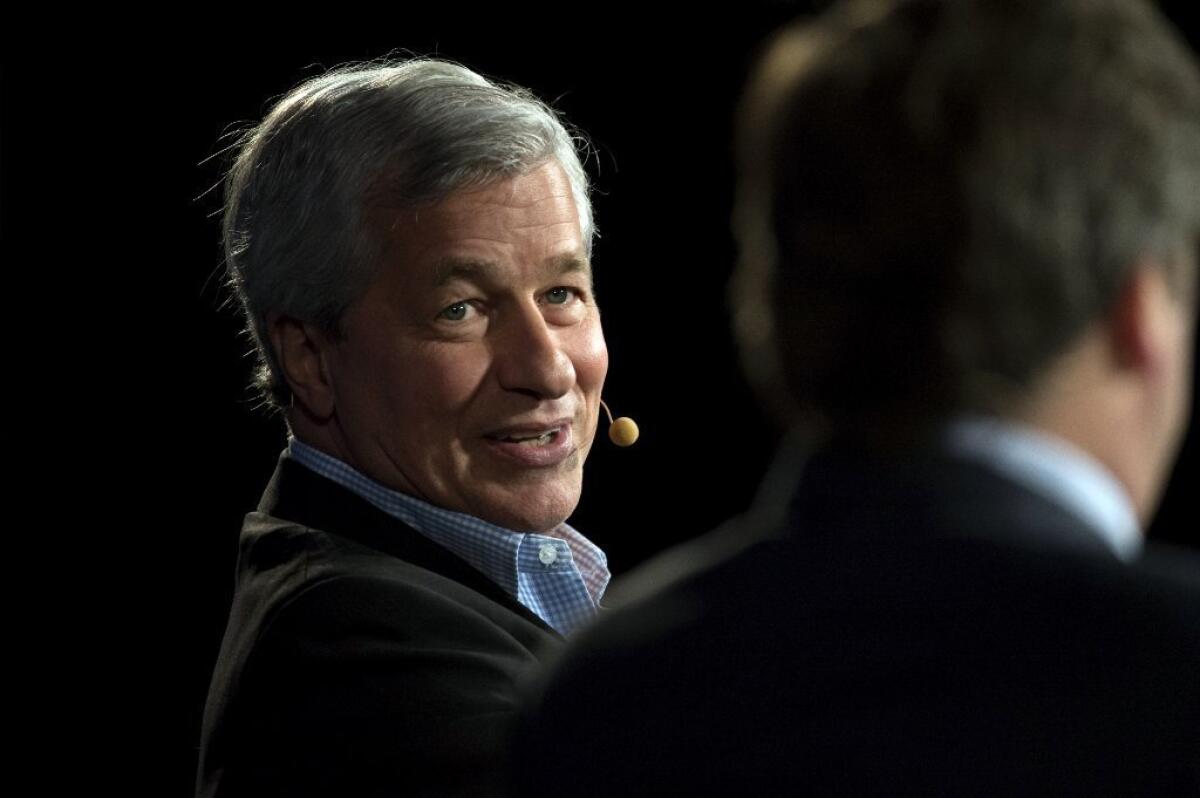Why Wall Street wants you to think it lost the war over regulation

- Share via
Talking up your opponent’s skills is a tactic that permeates sports, politics and business. The idea is to lower expectations of your own success so your subsequent victory looks even more spectacular and defeat (if it comes) less demoralizing. There’s no glory in beating up on a weakling.
Thus, the football team warns its fans that its rival shouldn’t be sniffed at; the candidate praises the debating skills of the opponent before facing him lectern-to-lectern; the chief executive downplays profit forecasts just before a quarterly blowout.
A sterling example of the form was delivered the other day by Politico, in an analysis headlined “How Washington Beat Wall Street.” After five years of contention over regulations to rein in risky behavior by big financial firms, the piece declares, “That war is largely over. And Washington won in a blowout.”
You couldn’t ask for a more perfect distillation of what Wall Street wants you to believe. But the truth is that the financial sector still wields excessive control over the economy, the big players have grown even bigger, and the regulators have been systematically emasculated.
As we documented here and here, even those agencies that have been given new regulatory tools have been deprived of the resources to wield them. Make no mistake: The regulatory defunding craze in Washington has been driven by the needs of the big financial institutions that are the targets of those regulations.
Politico treats the Dodd-Frank Act as a signal triumph of regulators over industry. But is it? Many regulations have been delayed and diluted by relentless pushback from Wall Street.
That includes the Volcker Rule, which is designed to stem risky proprietary trading by regulated banks but is much narrower in its final version than originally proposed. Economic analyst Mike Konczal calls the final rule “a pretty good start instead of an incoherent mess” -- in other words, not as bad as it could have been, but not as good as it should be. Konczal calls 2013 “a not-awful year for financial reform,” which is much closer to the mark than calling it a “blowout” for reformers.
As Stephen Gandel observed in Fortune back in September, the big banks are even bigger than they were five years ago, when the financial crisis struck. Former Labor Secretary Robert Reich, now teaching at UC Berkeley, put it succinctly in his blog on the fifth anniversary of the Lehman Bros. collapse: “The giant Wall Street banks are ungovernable — too big to fail, too big to jail, too big to curtail. They should be split up, and their size capped.”
Politico points to the mediocre financial results of the some of the big banks as evidence that their wings have been permanently clipped. “Wall Street is struggling to make money,” it says. Well, everything is relative. JPMorgan Chase recorded a profit of $17.9 billion for 2013. That’s 16% down from the year before but still, shall we say, copious.
One key reason for the decline is the billions in financial penalties JPMorgan has had to shovel out to regulators, along with the multi-billion-dollar loss it has recorded from its infamous “London whale” trade. It’s proper to note, however, that paying penalties for fraudulent behavior out of the corporate treasury is the antithesis of effective regulation: It leaves the wrongdoers in place, primed to find new markets to game.
That’s an important point overlooked by those who say Wall Street has been defeated by Washington. The real reason revenues and profits are down is that the asset bubbles that goosed them in recent years have been played out, especially housing and mortgage securitization. They’re played out because they were overplayed by these same Wall Street institutions, and the hangover has persisted. But it won’t last forever. Here’s an easy bet: A few quarters from now, the same firms will be declaring record results.
The important question is whether there’s anything in the new regulations that will prevent a recurrence in a different market. That’s doubtful, because the lawmaking and regulating cats are always a few steps behind the Wall Street mice.
Dennis Kelleher of Better Markets, a Wall Street critic, is quoted in the Politico piece stating that many high-risk activities by banks are “at least reduced and often totally gone.” But he says his quote is taken out of context and that he disagrees with the article’s premise. The truth, he wrote in a rebuttal, is that even though a few things have changed in the financial markets, the bankers are still in the saddle.
“Wall Street has a massive PR communications operation that daily promotes its skewed view of the world that they are picked on, beleaguered, and the subject of undeserving burdensome regulation,” he wrote.
The goal is to head off any further regulation by suggesting that what’s already come down is plenty. The first big shot in that campaign has been fired by Politico.
More to Read
Sign up for Essential California
The most important California stories and recommendations in your inbox every morning.
You may occasionally receive promotional content from the Los Angeles Times.














